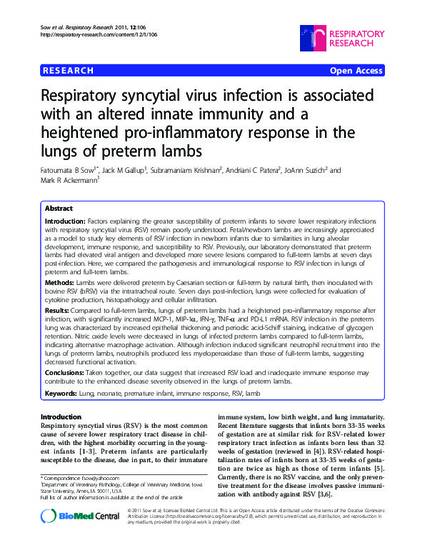
Article
Respiratory syncytial virus infection is associated with an altered innate immunity and a heightened pro-inflammatory response in the lungs of preterm lambs
Respiratory Research
Document Type
Article
Disciplines
Publication Date
8-9-2011
DOI
10.1186/1465-9921-12-106
Abstract
Introduction Factors explaining the greater susceptibility of preterm infants to severe lower respiratory infections with respiratory syncytial virus (RSV) remain poorly understood. Fetal/newborn lambs are increasingly appreciated as a model to study key elements of RSV infection in newborn infants due to similarities in lung alveolar development, immune response, and susceptibility to RSV. Previously, our laboratory demonstrated that preterm lambs had elevated viral antigen and developed more severe lesions compared to full-term lambs at seven days post-infection. Here, we compared the pathogenesis and immunological response to RSV infection in lungs of preterm and full-term lambs.
Methods Lambs were delivered preterm by Caesarian section or full-term by natural birth, then inoculated with bovine RSV (bRSV) via the intratracheal route. Seven days post-infection, lungs were collected for evaluation of cytokine production, histopathology and cellular infiltration.
Results Compared to full-term lambs, lungs of preterm lambs had a heightened pro-inflammatory response after infection, with significantly increased MCP-1, MIP-1α, IFN-γ, TNF-α and PD-L1 mRNA. RSV infection in the preterm lung was characterized by increased epithelial thickening and periodic acid-Schiff staining, indicative of glycogen retention. Nitric oxide levels were decreased in lungs of infected preterm lambs compared to full-term lambs, indicating alternative macrophage activation. Although infection induced significant neutrophil recruitment into the lungs of preterm lambs, neutrophils produced less myeloperoxidase than those of full-term lambs, suggesting decreased functional activation.
ConclusionsTaken together, our data suggest that increased RSV load and inadequate immune response may contribute to the enhanced disease severity observed in the lungs of preterm lambs.
Rights
This is an Open Access article distributed under the terms of the Creative Commons Attribution License (http://creativecommons.org/licenses/by/2.0), which permits unrestricted use, distribution, and reproduction in any medium, provided the original work is properly cited.
Copyright Owner
Sow et al.
Copyright Date
2011
Language
en
File Format
application/pdf
Citation Information
Fatoumata B. Sow, Jack M. Gallup, Subramaniam Krishnan, Adriani C. Patera, et al.. "Respiratory syncytial virus infection is associated with an altered innate immunity and a heightened pro-inflammatory response in the lungs of preterm lambs" Respiratory Research Vol. 12 (2011) p. 106 Available at: http://works.bepress.com/mark_ackermann/20/

This article is from Respiratory Research 12 (2011): 106, doi:10.1186/1465-9921-12-106.